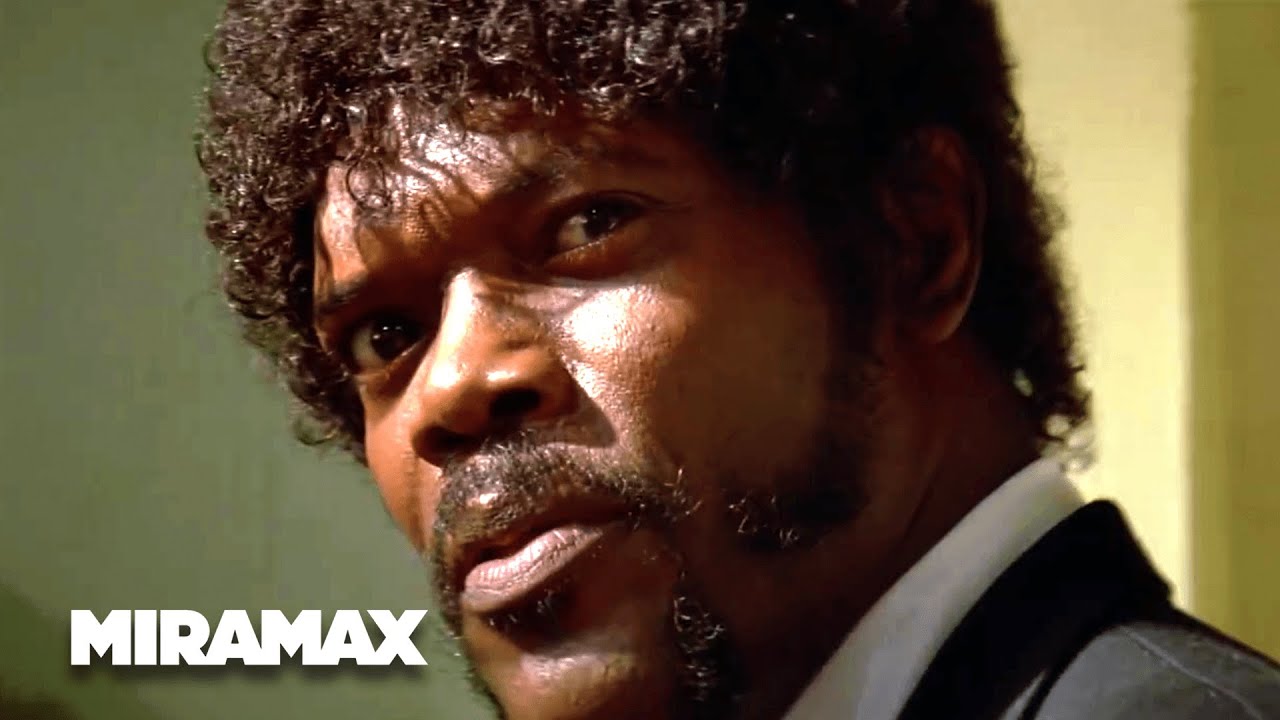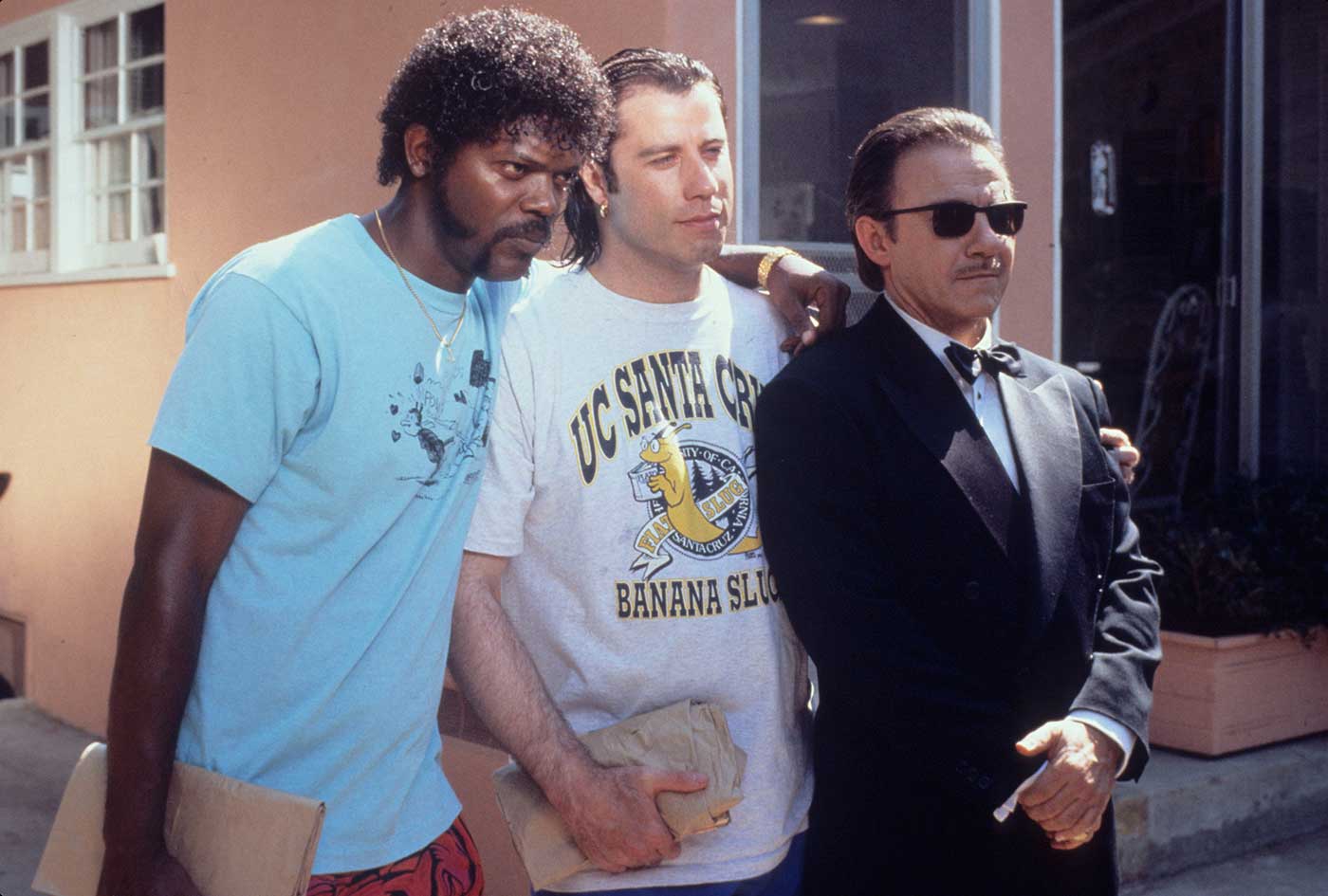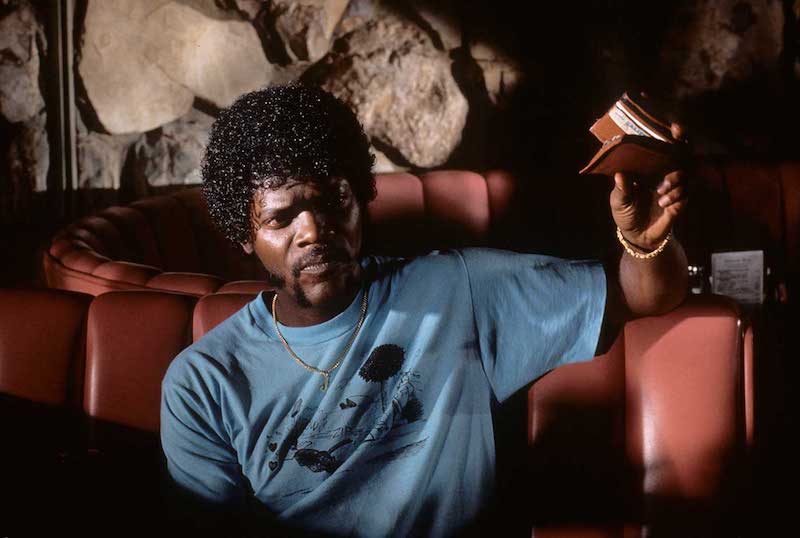We're celebrating each of the upcoming Honorary Oscar winners with a few pieces on their career.

“And you will know my name is the Lord when I lay my vengeance upon thee.”
by Lynn Lee
If Jungle Fever (1991) put Samuel L. Jackson on Hollywood’s map, Pulp Fiction (1994) made him a star. With his jheri curl helmet, glowering eyes, and stentorian voice, Jackson’s gun-toting, Bible-quoting Jules Winnfield became an instant icon. At least, it wasn’t long before high school and college boys of the mid to late ’90s were sporting “BAD MOTHERFUCKER” wallets and reciting his “path of the righteous” speech – without, of course, anything resembling SLJ’s diction or élan.
It wasn’t just him, of course...
Practically every character in Pulp Fiction and every beat of their talky, casually violent, non-linear narratives have become embedded in our zeitgeist, whether it’s John Travolta and Uma Thurman doing the twist at Jack Rabbit Slim’s, Bruce Willis tersely pronouncing “Zed’s dead, baby” to his girlfriend as they ride off on a chopper, or Harvey Keitel supervising a messy body disposal while for some reason wearing a tuxedo at 9 am. Still, even among an impressive array of star-making and career-reviving performances, Jackson’s stands out.
To this day SLJ is so closely associated with Jules it’s both remarkable he went on to have as diverse a career as he did and impossible to imagine anyone else playing the part. Allowing for hindsight bias from dozens of intervening movies and “motherfuckers,” it still reads like it was written for him. Indeed, Jackson himself believed it was, although Tarantino has since revealed he wrote it for Laurence Fishburne, who turned it down. While Fishburne is a fine actor and would have brought his own unique flavor to the role, I can’t see him inhabiting every fiber of it the way Jackson does.
In Jackson’s hands, Jules is a man of many moods and dimensions, arguably the most of any character in Pulp Fiction. He may be remembered most vividly as a fearsome instrument of vengeance, but he’s really a conundrum: loquacious, expressive, funny, yet elusive, constantly shifting tonal registers depending on his audience, his objective, and his own fancy. He’s always keeping you guessing and always manages to surprise, no matter how many times he’s done this shit before.
 Image from the Academy's Pulp Fiction collection
Image from the Academy's Pulp Fiction collection
Take his first scene where he and his partner, Vincent (Travolta), carry out a hit. On the way to the job site, they’re engaging in the kind of low-key mundane, digressive chatter that would become a Tarantino trademark, on everything from fast food in Europe to the purpose of TV pilots to where foot massages rate on the scale of physical intimacy. Once they arrive, both shift to all-business mode, but it’s Jules who takes the lead and undergoes the most visible and terrifying transformation. He starts on a note of hideously false geniality, laced with menace, as he toys with their target like a cat with a mouse, chit-chatting and helping himself to a burger (“the cornerstone of every nutritious breakfast!”) all the while fixing his prey with a gimlet gaze, before pivoting to brutal interrogation and execution mode.
It all culminates in his thunderous declamation of Ezekiel 25:17 – or, more accurately, the Tarantino edit of a punched-up version of Ezekiel 25:17 from the Sonny Chiba flick The Bodyguard. Even when you know it’s coming, the deadly climax of this scene still manages to shock and awe, as much through the slow escalation of Jackson’s fire-and-brimstone delivery as the hail of gunfire that punctuates it. The spell he casts is so mesmerizing that the abrupt fade and narrative jump forward that follows always feels disorienting – all the more so since Jules is notably absent from most of the next hour and a half. And while there are plenty of thrills, chills, and cringey moments during the Jules-less chapters, the film does lose a bit of its energy without him.
With his return, the movie dives even deeper into black comedy, successfully mining an almost-vaudevillian humor from the contrasting reactions of Vincent and Jules to the same series of improbable events. At the same time, Tarantino adds a metaphysical gloss to Jules’ arc that could have just become more fodder for laughs but in Jackson’s hands becomes something much more layered and compelling. He has to do yet more quick tonal shifting here, from amazement at surviving what should have been certain death to exasperation at the predicament caused by Vincent’s trigger finger (no one but Samuel L. Jackson could make a profane harangue about being on “brain detail” quite so hilarious) to his epiphany that God has personally reached out to him in letting him live.
Jackson plays this final turn completely straight, and against all odds, it works. The force of Jules’ conviction cuts through both Vincent’s skepticism and ours (and, if he could talk, poor headless Marvin’s), and makes his final scene – the standoff in the diner – absolutely riveting. The Ezekiel passage surfaces again, this time in a quiet, contemplative tone that couldn’t be more different from its earlier appearance. Only in his final warning to Tim Roth’s hapless robber – “I’m trying real hard to be the shepherd” – do we see a glimmer of the old Jules in his eyes and inflection. It’s a master class of suggestion, and a perfect note on which to end the film.

Jackson’s performance would net him his first and to date only Oscar nomination, for supporting actor, which he lost to Martin Landau for Ed Wood. Not having seen Ed Wood, I won’t opine on that outcome; all I know is Jackson should have been a close contender for the win. Miramax/Weinstein calculations notwithstanding, I also don’t believe his supporting campaign was category fraud: Pulp Fiction is the quintessential ensemble picture, meaning Jackson, Travolta, and Willis could all arguably have gone either lead or supporting. According to one breakdown of screen time Travolta had the most, followed by Willis, with Jackson less than a minute behind – which makes sense, given that Jules, unlike the other two, doesn’t get his own solo story arc. And yet, in another sense, he does. In a way, his is the only character who evolves at all, who reflects on the meaning of his actions instead of just following his instincts. Perhaps that’s why, of all the colorful characters in Pulp Fiction, his is the one that’s endured most powerfully in collective memory.
Previously on the Honoraries
- Liv Ullmann, Face to Face
- Liv Ullmann, Shame
- Liv Ullmann, Persona
- Danny Glover, Producer
- Danny Glover, Places in the Heart
- Danny Glover, To Sleep With Anger
- Elaine May, Ishtar
- Elaine May, Mikey & Nicky
- Elaine May, The Heartbreak Kid
- Elaine May, A New Leaf